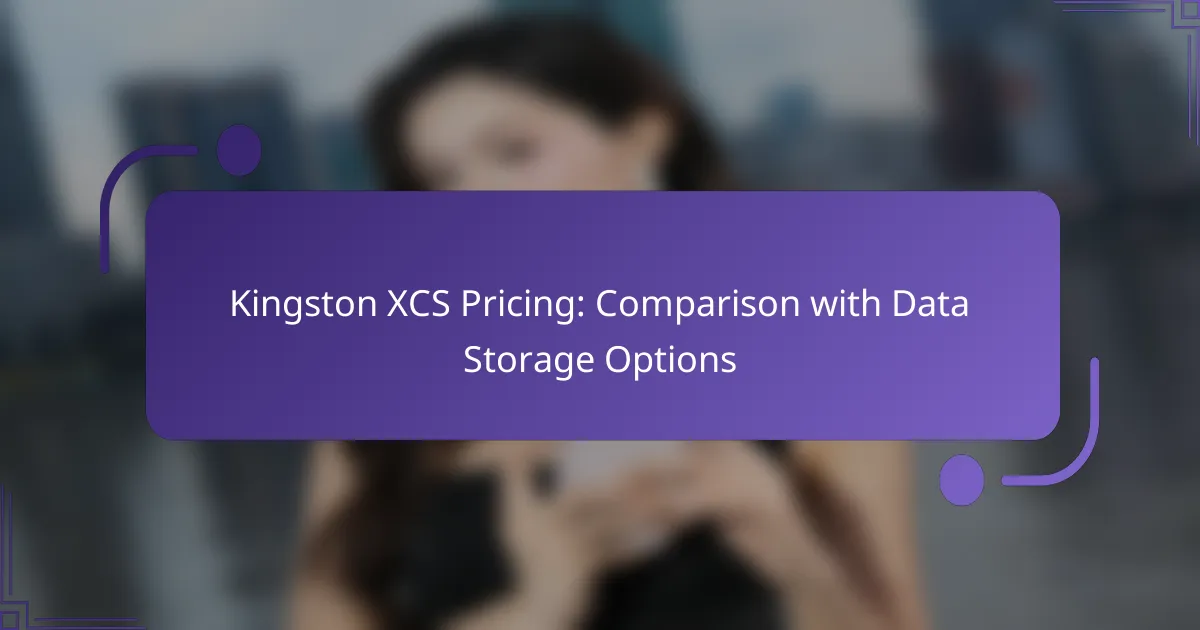The Kingston XCS pricing is competitive within the solid-state drive (SSD) market, providing excellent performance at an attractive cost. When comparing it to other data storage options, it’s essential to consider factors such as speed, durability, and warranty, alongside the price. With advanced features aimed at efficient data management, the Kingston XCS stands out as a reliable choice for both personal and professional use.
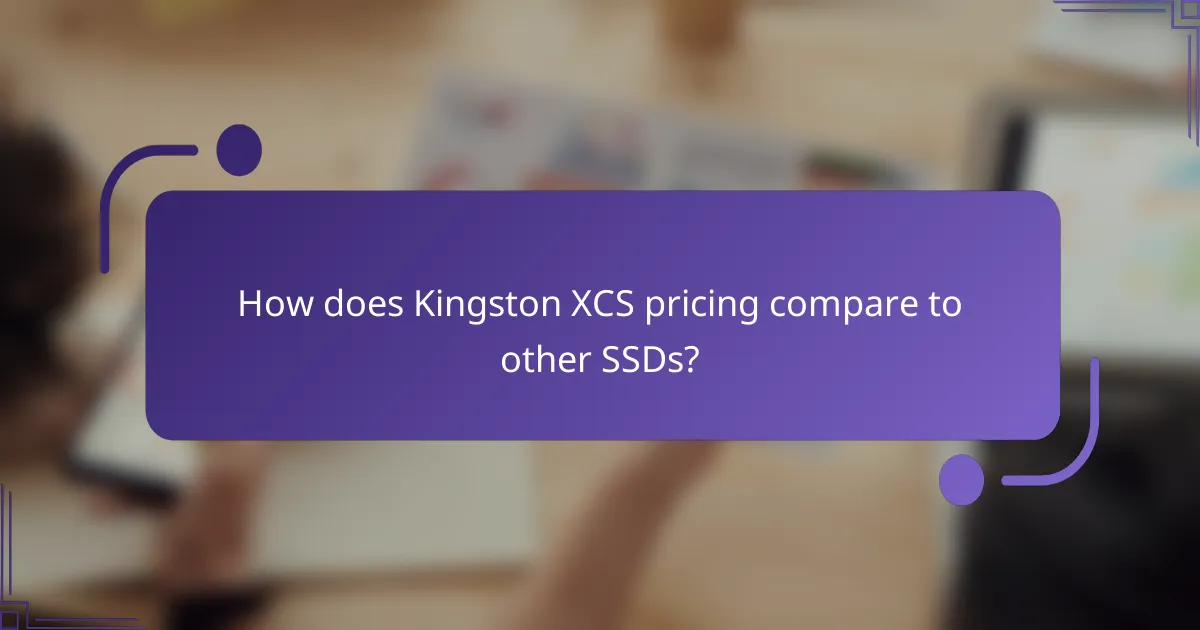
How does Kingston XCS pricing compare to other SSDs?
Kingston XCS pricing is generally competitive with other solid-state drives (SSDs) on the market, offering good performance at a reasonable cost. When evaluating Kingston XCS against its peers, factors such as speed, durability, and warranty should also be considered alongside price.
Competitive pricing analysis
The Kingston XCS series typically falls within a mid-range price bracket compared to other SSD brands like Samsung and Crucial. While premium brands may offer advanced features, Kingston XCS provides a solid balance of performance and affordability, making it a popular choice for budget-conscious consumers.
For example, while high-end SSDs can exceed $200 for higher capacities, Kingston XCS models often range from $50 to $150, depending on storage size and specifications. This makes them an attractive option for both casual users and professionals looking for reliable storage solutions.
Price per GB comparison
When comparing price per gigabyte, Kingston XCS SSDs often offer a competitive edge. Prices can range from approximately $0.10 to $0.30 per GB, which is comparable to other mid-range SSDs. This cost-effectiveness is particularly appealing for users needing large storage capacities without breaking the bank.
In contrast, premium SSDs may cost upwards of $0.40 per GB, which can significantly impact overall budget for larger storage needs. Therefore, for users prioritizing value, Kingston XCS presents a compelling option in terms of price per gigabyte.

What are the key features of Kingston XCS?
The Kingston XCS offers a range of advanced features designed for efficient data storage and management. Key attributes include high-speed performance, robust durability, and comprehensive warranty options, making it suitable for both personal and professional use.
Performance specifications
The Kingston XCS is engineered for optimal performance, typically achieving read speeds in the range of hundreds of MB/s and write speeds that can vary based on the specific model. This high throughput is essential for applications requiring quick data access and transfer.
When considering performance, it’s important to evaluate the interface type; models using NVMe technology generally provide faster speeds compared to those using SATA. Users should assess their specific needs, such as gaming or video editing, to choose the right model.
Durability and warranty
Durability is a significant feature of the Kingston XCS, with many models built to withstand harsh conditions, including temperature extremes and shock. Most Kingston XCS products come with a warranty that typically spans several years, providing peace of mind for users concerned about longevity.
When selecting a storage solution, consider the warranty terms and the manufacturer’s reputation for reliability. A solid warranty can indicate confidence in the product’s durability and performance over time.
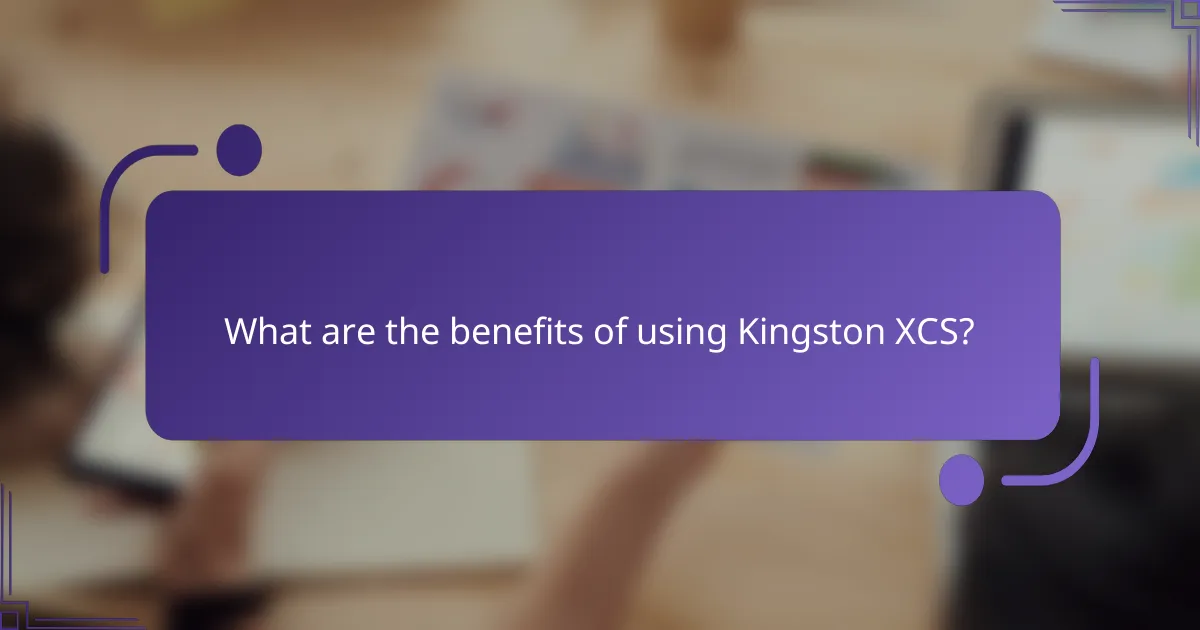
What are the benefits of using Kingston XCS?
Kingston XCS offers several advantages, including enhanced speed and robust data security features. These benefits make it a compelling choice for users looking for reliable and efficient data storage solutions.
Speed advantages
The Kingston XCS is designed to deliver high-speed data transfer rates, significantly reducing the time required for file uploads and downloads. Users can expect speeds that often reach several hundred megabytes per second, making it suitable for tasks that demand quick access to large files.
For example, when compared to traditional hard drives, the Kingston XCS can provide performance improvements of up to 70% in data retrieval times. This speed is particularly beneficial for professionals in fields like video editing or data analysis, where every second counts.
Data security features
Data security is a critical aspect of the Kingston XCS, which includes features such as encryption and secure erase capabilities. These tools help protect sensitive information from unauthorized access and ensure that data can be permanently deleted when no longer needed.
Additionally, Kingston XCS complies with various industry standards for data protection, making it a trustworthy option for businesses that handle confidential information. Users should consider implementing regular backups alongside these security features to further safeguard their data.
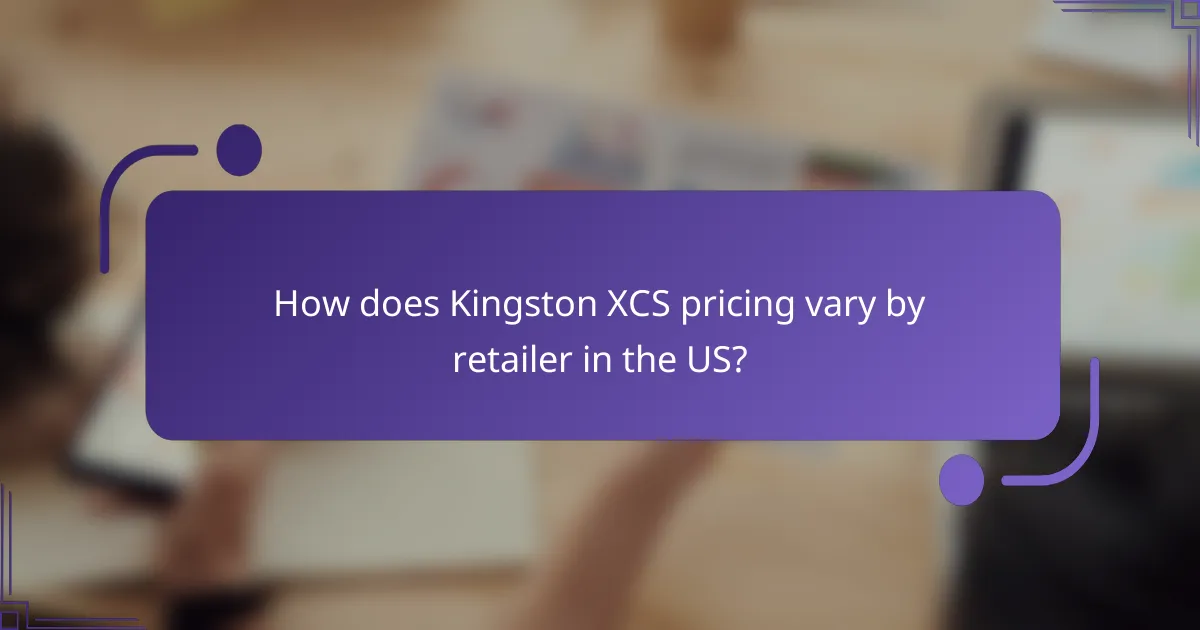
How does Kingston XCS pricing vary by retailer in the US?
Kingston XCS pricing can differ significantly across various retailers in the US, influenced by factors such as location, sales promotions, and stock levels. Generally, prices range from the low tens to mid-hundreds of dollars, depending on the storage capacity and specifications.
Major retailers pricing overview
Major retailers like Best Buy, Amazon, and Newegg typically offer Kingston XCS products at competitive prices. Best Buy may have in-store promotions that can lower prices, while Amazon often features discounts and deals that fluctuate frequently. Newegg is known for its tech-focused sales, which can also provide attractive pricing.
For example, Kingston XCS models with 1TB capacity might be priced around $50 to $80, while higher capacities could reach $150 or more. It’s advisable to compare prices across these retailers to find the best deal.
Online vs. in-store pricing
Online pricing for Kingston XCS products often tends to be lower than in-store prices due to reduced overhead costs. Retailers like Amazon and Newegg frequently offer exclusive online discounts, making it easier to find competitive pricing without the need to visit a physical store.
However, in-store purchases may provide immediate availability and the option to consult with staff for advice. Some retailers may also offer price matching, which can help align in-store prices with online offers. Always check for any shipping fees when ordering online, as they can impact the total cost significantly.
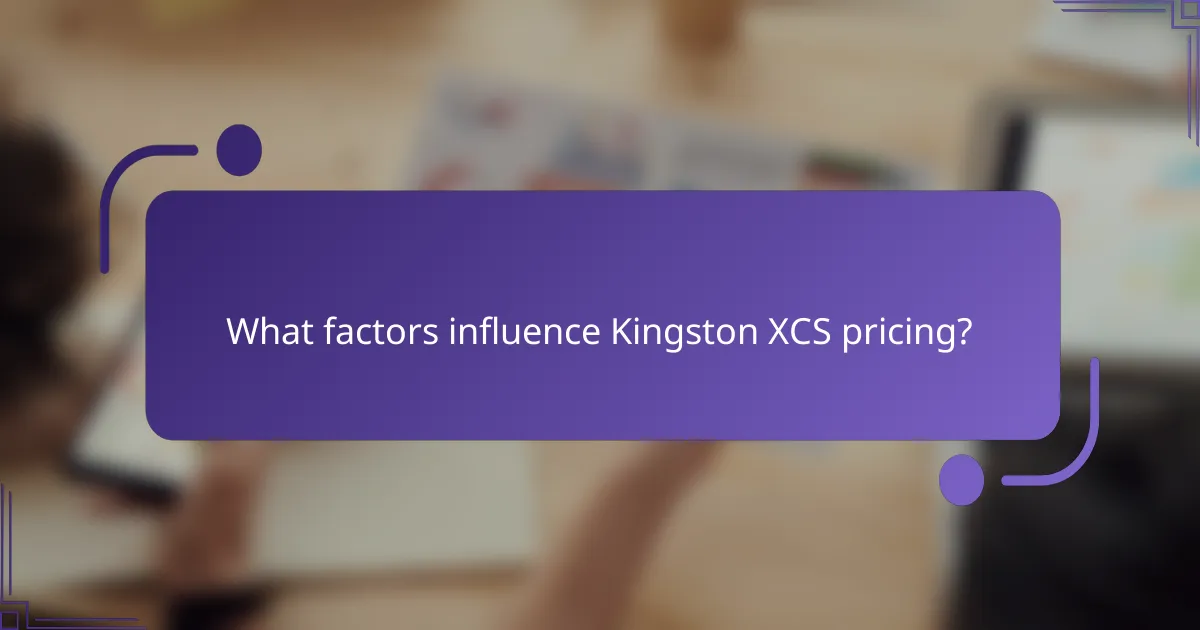
What factors influence Kingston XCS pricing?
Kingston XCS pricing is influenced by various factors including market demand, technological advancements, and production costs. Understanding these elements can help consumers make informed decisions when comparing Kingston XCS with other data storage options.
Market demand trends
Market demand trends play a significant role in determining the pricing of Kingston XCS products. When demand for high-performance storage solutions rises, prices may increase accordingly. Conversely, during periods of low demand, prices might drop to attract buyers.
For instance, seasonal sales events or the release of new technology can create fluctuations in demand. Consumers should monitor these trends to identify the best times to purchase Kingston XCS products, potentially saving money.
Technological advancements
Technological advancements directly impact Kingston XCS pricing by introducing new features and improvements. As storage technology evolves, products with enhanced speed, capacity, and durability may command higher prices due to their superior performance.
For example, the introduction of faster interfaces like NVMe can lead to increased prices for Kingston XCS products that utilize these technologies. Buyers should consider the long-term benefits of investing in newer technologies, as they may offer better value over time despite higher upfront costs.

How to choose the right data storage option?
Choosing the right data storage option involves evaluating your specific needs, including capacity, speed, and budget. Consider factors such as the nature of your data, access frequency, and security requirements to make an informed decision.
Comparison criteria
When comparing data storage options, focus on key criteria such as performance, cost, scalability, and durability. Performance is often measured in terms of read/write speeds, while cost can vary significantly based on storage type, such as SSDs versus HDDs.
Scalability is crucial for growing businesses, as it allows you to expand storage capacity without major disruptions. Durability refers to the reliability of the storage medium, with SSDs generally offering better resistance to physical shock compared to traditional HDDs.
Use case scenarios
For personal use, cloud storage solutions like Google Drive or Dropbox may be ideal for their accessibility and ease of use. However, for businesses handling large datasets, on-premises solutions or dedicated servers might be more suitable due to enhanced control and security.
In scenarios where speed is critical, such as video editing or gaming, high-performance SSDs are recommended. Conversely, for archival purposes where access speed is less critical, traditional HDDs can provide a cost-effective solution.
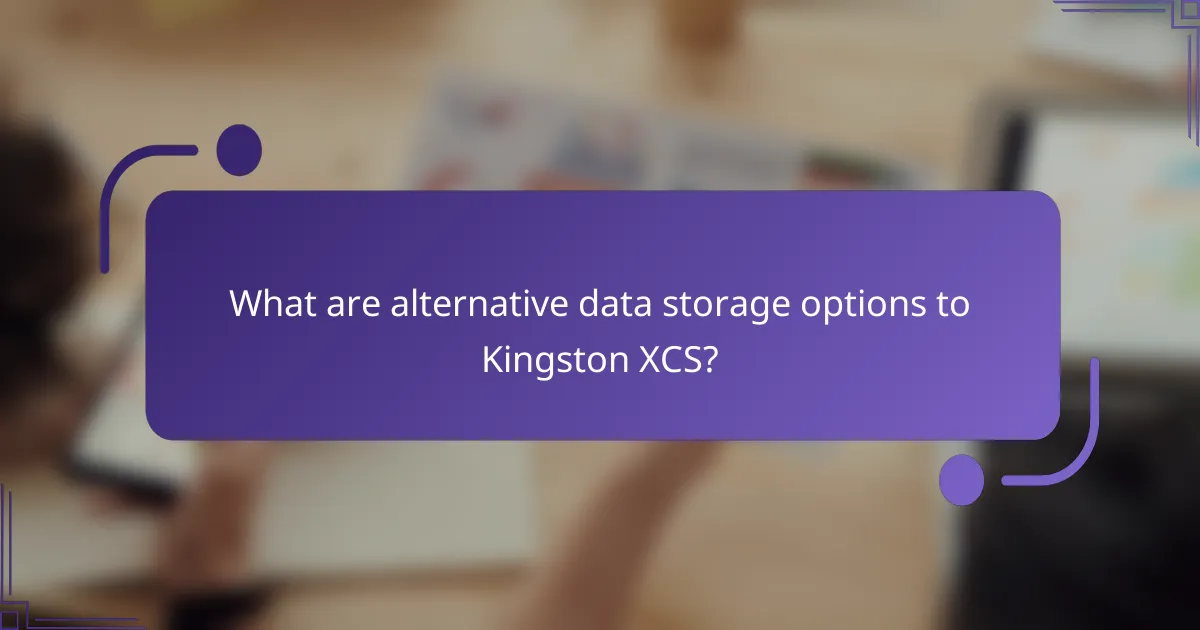
What are alternative data storage options to Kingston XCS?
Alternative data storage options to Kingston XCS include various SSDs and HDDs that offer different performance levels and pricing. Popular choices like Samsung and Western Digital provide competitive features and pricing, making them viable alternatives for users seeking reliable storage solutions.
Samsung 970 EVO pricing
The Samsung 970 EVO is known for its high performance and reliability, making it a popular choice among users. Pricing typically ranges from around $50 to $150, depending on the storage capacity, which can vary from 250GB to 2TB.
When considering the Samsung 970 EVO, look at the read and write speeds, which can reach up to 3,500 MB/s and 2,500 MB/s respectively. This makes it suitable for tasks requiring fast data access, such as gaming or video editing.
Western Digital Black SN850 pricing
The Western Digital Black SN850 is another high-performance SSD option, often priced between $100 and $300 based on the capacity, which ranges from 500GB to 2TB. This drive is designed for gamers and professionals who need top-tier speed and performance.
Key features of the SN850 include read speeds up to 7,000 MB/s and write speeds around 5,300 MB/s, making it one of the fastest drives available. Users should consider their specific needs, such as gaming or heavy data processing, when choosing this drive.
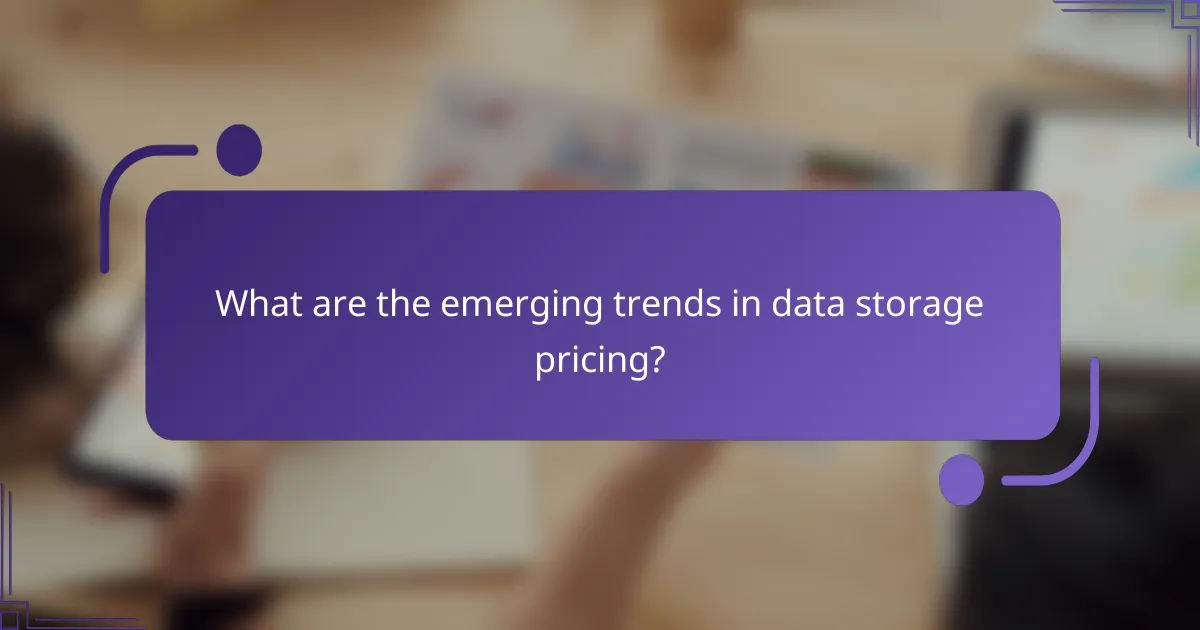
What are the emerging trends in data storage pricing?
Emerging trends in data storage pricing indicate a shift towards more flexible and scalable options, driven by the increasing demand for cloud solutions and the need for efficient data management. As businesses seek to optimize costs, they are gravitating towards pay-as-you-go models and hybrid storage solutions that combine on-premises and cloud resources.
Impact of cloud storage on pricing
Cloud storage significantly influences pricing structures by offering scalable solutions that adjust to user needs. This flexibility allows businesses to pay only for the storage they use, often resulting in lower costs compared to traditional on-premises solutions. For example, small to medium-sized enterprises can avoid large upfront investments and instead opt for monthly subscriptions.
Moreover, the competition among cloud providers has led to a decrease in prices and an increase in features. Major players like Amazon Web Services, Google Cloud, and Microsoft Azure frequently adjust their pricing models, which can include discounts for long-term commitments or tiered pricing based on usage levels.
When considering cloud storage, businesses should evaluate their data access patterns and storage needs. It’s essential to avoid over-provisioning storage and to regularly review usage to ensure that they are not paying for unused capacity. Additionally, understanding the terms of service and potential hidden costs, such as data retrieval fees, can help in making informed decisions.
